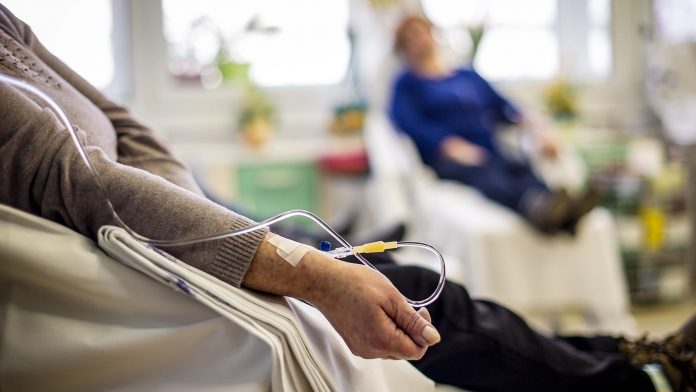
Cancer Research UK finds that giving colon cancer patients chemotherapy before surgery cuts their risk of the disease returning.
In a new Cancer Research UK-funded clinical trial called the FOXTROT trial, researchers found that giving colon cancer patients chemotherapy before rather than after surgery reduced the chance of cancer returning within two years by 28%.
Colon cancer is one of the most common types of cancer diagnosed in the UK, with many people diagnosed over 60. The three main symptoms are persistent blood in your poo, a persistent change in your bowel habit and persistent lower abdominal pain, bloating or discomfort.
The research is published in the Journal of Clinical Oncology.
Studying the effects of chemotherapy on colon cancer
The researchers used data from 1,053 colon cancer patients from 85 hospitals in the UK, Denmark and Sweden involved in the study, led by scientists at the University of Birmingham and the University of Leeds.
Colon cancer patients were divided into two groups in the study. The first group received six weeks of chemotherapy, followed by surgery, and then 18 weeks of chemotherapy. The second group had standard treatment for colon cancer, which was surgery first, followed by 24 weeks of chemotherapy.
The scientists found that patients who had chemotherapy before surgery were significantly less likely to see their colon cancer come back, compared with those who got all their chemotherapy after surgery.
This has led scientists to believe that giving chemotherapy to colon cancer patients before surgery could be easily adopted by the NHS and other health services.
Associate Professor at the Birmingham Clinical Trials Unit at the University of Birmingham, Dr Laura Magill, said: “Up to one in three colon cancer patients can see their cancer come back after surgery. That figure is far too high, and we need new treatment strategies to stop colon cancer from coming back.
“The standard approach has been to give chemotherapy after surgery to eradicate any cancer cells that might have spread before surgery. But our research shows that giving some of that chemotherapy before surgery increases the chances that all cancer cells will be killed.
“A growing body of evidence is showing the value of pre-operative chemotherapy in several other cancers, and we believe that our results could transform how we approach colon cancer in the clinic.”
Further clinical trials are being carried out
The scientists are now carrying out two further clinical trials, FOXTROT-2 and FOXTROT-3, to investigate whether older patients could also benefit from chemotherapy before surgery and to investigate if adding in more chemotherapy drugs before surgery reduces the chances of cancer returning.
If the new trials are successful, patients could receive more tailored cancer treatment, with new types and combinations of chemotherapy offered to different patients based on how likely they are to benefit from it.
Professor of Surgery at the University of Birmingham, Professor Dion Morton, said: “In many parts of the world cancer treatments can be prohibitively expensive. We wanted to go in the opposite direction, testing a treatment that could be used on the widest possible group of patients.
“Thanks to funding from Cancer Research UK, doctors in countries around the world will now be able to put these findings into clinical practice, saving many thousands of lives.”










